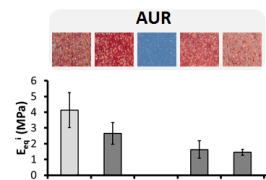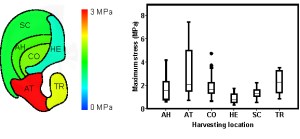Micro-mechanics
Mechanical material properties are highly important in biological development, disease aetiology and musculoskeletal function. We provide high-quality mechanical characterisation of biological materials using multiple experimental testing protocols and devices for measuring and analysing the role of micro-mechanics in hard and soft biological structures. These devices include protocols for determination of friction, fracture, tension, compression, indentation and viscoelastic material properties.
We have custom add-ons for high-throughput testing, image-guided assessment, and testing within physiological environments.
Micro-mechanical testing

- High-throughput, reproducible, mechanical testing and analysis of tissue-engineered and soft biological materials
- Tension, compression, 3- and 4-point bending, pullout, torsion, creep, stress-relaxation tests
- Fracture healing and implant fixation testing
- Image-guided mechanical testing: mechanical testing combined with microscopy or microCT imaging
Micro-mechanical processing and analysis

- High-throughput processing of mechanical data using Matlab to give standard material properties
- Custom-scripts for extracting material properties of interest to biological questions
High-throughput stress-relaxation indentation testing of cartilage and cartilage-like materials
Defining the benchmark for how strong and stiff tissue-engineered cartilage needs to be from native tissues, provides a target for tuning of biomaterials to match this benchmark.
Contact us directly for more information: kathryn.stok@unimelb.edu.au